The Effects of Hierarchy on Education and Vocation

An essential part of the so called E-Myth1 concerning starting a business is the idea that 1 basically, people don’t matter. That is to say processes matter more than people, at least with respect to hierarchies. The same forces that originally created efficiencies in the corporate world have been used to exploit education
through how it is administered. The method of leveraging processes over people has its origins in the scientific management techniques found in the practices of Frederick Taylor and Henry Ford which date back some one hundred years. The idea in scientific management is to gain efficiency by shifting the business model into an assembly line format. As education was influenced by scientific management2 the curriculum changed. The previous emphasis on natural, organic, and self sustainable skills necessary for critical thinking and selling a product on the market gave way to a focus on those which better served scientific management.
While hierarchies have used scientific management in order to control traditional education, they have also used strategic adaptations to labor markets to control vocational training. This was done by offloading the costs of training onto the employee while promoting firm specific training over generic training. We can therefore explore the exploitation of learning as two separate forms of exploitation: the exploitation of education and the exploitation of vocational training.
Exploitation in Education
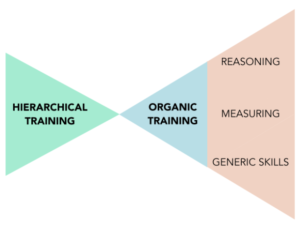
Hierarchical ~ Organic
Universities and centers of higher learning have historically emphasized broad educational goals3 with a focus on questioning assumptions. With Taylorism, Fordism, and scientific management the educational content of our educational systems have been skewed towards teaching a cultural behavior conducive to a hierarchy45. The first stage of an individual’s training takes place within an educational system that prepares students to be directed within a hierarchy instead of preparing them to be part of a participatory democracy. The second stage of training (vocational training) takes place in a corporate hierarchy. Here, managers must make a “train/no-train” decision on an employee by employee basis. When deciding how to best train its members, hierarchies have conflicts of interest with two types of content:
1. Teaching an organic curriculum that includes reasoning, negotiation, and measuring
2. Teaching generic skills versus firm specific skills.
Reasoning skills are omitted in both the first and second stages of training, but would be most efficiently taught in the earlier educational stage so they are included here.
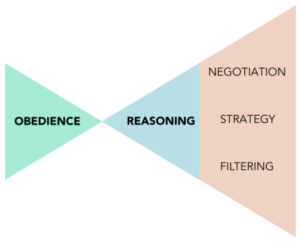
Obedience ~ Reasoning
Reasoning is the most basic category of education that is undesirable and not taught in a hierarchical structure. Immediate obedience to orders is the most desirable social skill in a hierarchy and is opposed to reasoning. “Reasoning” is a skill needed to participate efficiently with a group of peers. The major subcategories under reason are logic, negotiation. strategy, and filtering.
It is noteworthy that the most basic formal logic is neither taught nor valued at educational institutions6. For evidence you can conduct a simple test. A good experiment is to ask a few people that you know to make a valid formal logical argument. The vast majority of the time you will be met with difficulty and perhaps a raised eyebrow. Argumentation is not valued in hierarchies. The teaching of negotiation, or the ability to find a win-win solution, also is not found in hierarchies. Strategy, or the art of taking other people’s decisions into consideration when making your own decisions7, invites hesitation with respect to obedience to orders. Contrary to popular belief, strategic cooperation is not needed and possibly undesirable in a hierarchical structure. Cooperation skills run the risk of enabling collective bargaining, which is hostile to hierarchies. Sifting through the large amount of information received from our shared environment falls under filtering. Experts help us to filter that information while at the same time becoming another source of information that must be filtered. Expert filtering describes the process of how one takes advice from experts. This critical question can be expressed in several different ways:
● How do you define, find, and approach experts?
●How much do you need to know about what you don’t know?
● How much of the iceberg do you need to see in order to navigate the waters?
Managing -> Measuring
“What gets measured gets done”, a quote often attributed to Peter Drucker8 , is of the utmost importance to coordination and efficiency in business. If we consider the process of getting a product or service all the way to being sold on the market, we can note numerous types of measuring skills that are undeveloped in the majority of employees. These types of measuring skills are needed to create equitable outcomes among all parties involved in creating a product. The profit motive is opposed to
equitability in that if the members in a hierarchy were knowledgeable about measuring, they would obtain equitable results which is undesirable to the upper tiers of a hierarchy. Three important areas that require measuring skills are estimation, implication costs, and coordination costs.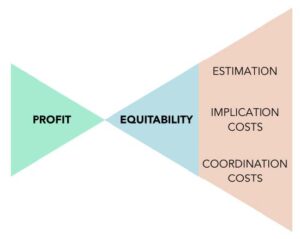
Estimation -> Agent Negotiation ~ Hierarchy Negotiation
In the principal (the entity that asks for work to be done) and the agent (the entity that does the work) relationship, when the agent has the ability to justify estimates it then enters into a better negotiation position. A better negotiation position for the agent is undesirable to a principal which would normally be higher in the hierarchy. Estimation examines the direct costs of production of a product or service which include time and materials.
Knowing the implication costs of a product or services involves knowing the opportunity and vulnerability costs associated with it. Opportunity costs are the loss of the potential gain from alternatives to the product or service. Vulnerability costs are the risks assumed when choosing the product or service. Implication costs contribute to overall value and can be used as a way to create a baseline value of a product or service.
Coordination costs are based on the effort to galvanize a group of people and keep them incentivized. The cost of creating a leadership vision and incentive policy is among the biggest coordination costs. The ability to create and commit to a position that is captured in a vision is a difficult task, and hard to quantify. The question arises if such an ability is worth three hundred and thirty five times9 the amount of the lowest paid implementor of said vision, as is the case with the 2015 CEO-to-worker pay ratio. Questioning the monetary value of a vision against the cost of the implementing that vision is a good starting point for bounding the value of a vision. Incentivizing the implementors of a vision can be done in many ways. The least costly way would be the status quo which involves paying people market rates with little to no ownership. A more costly but more fair10 way would be to set up a system of reward that takes into account sweat equity, material investment, and risk while promoting cooperation and participation. These types of coordination costs are not normally considered management costs, which can be accounted for in the direct cost of creating the product or service.
Exploitation in Vocational Training
The exploitation of training during the vocational period of an individual’s life usually takes place after the educational period. The figure below shows how the training has progressed in the field of software from the 1990s through the 2010s. The general rule is that training goes from being subsidized by the employer to being self funded by the employee. It also regresses from creating a strong job market signal to creating a weak job market signal for the employee.
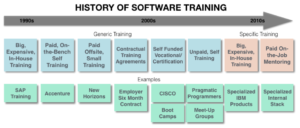
The emergence of alternative ways to signaling productivity, such as development of open source software in public accounts, has emerged as a response to lack of being able to signal that one is ‘well trained’ at a corporate entity. Today the only signal obtained by an employee from a prestigious company
Firm skills -> Lock in
David Besanko et al of the Kellogg School of Management say :“Managers should also draw a distinction between firm-specific and task-specific learning. If learning is task-specific rather than firm-specific, then workers who acquire skill through learning may be able to shop around their talents and capture value for themselves in the form of higher wages. When learning is firm-specific, worker knowledge is tied to their current employment, and the firm will not have to raise wages as the workers become more productive. Managers should encourage firm-specific learning …”.11
So it makes rational, economic sense in a hierarchy to train employees in such as way as to make them less valuable on the free market. This makes it rational for employees to take responsibility for their own generic training. The implication of not engaging in generic training for the employee is lock in to the current position. Another risk is unemployment if layoffs occur while their transferable skills have a reduced signal.
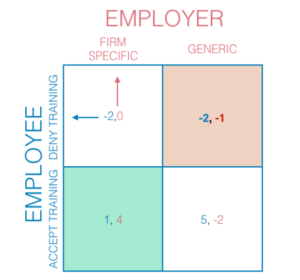
In order to illustrate the rationality of an employer and employee within vocational training, we can imagine each combination of decisions as a separate engagement from the standpoint of the employee as follows:
Denying the Firm Specific Training
When your employer provides firm specific training (like how to use an internal company software system, or training on vendor specific development tools that are rarely used at other firms) to you and you deny that training, you are seen as not having the company’s best interests in mind. The company loses
because they aren’t able to increase your efficiency. Your career is hurt at this specific company, but the harm is negligible on the labor market.
Denying the Generic Training
When your employer offers generic training you deny it, you end up hurting the employer and yourself greatly. Your employer loses your increased efficiency but you lose your enhanced job marketability and productivity. The opportunity cost for you is large. The cost of having generic training available is usually (not always) more than the cost of the firm specific training, so there can be an additional loss for your employer.
Accepting the Firm Specific Training
If you accept training but your employer offers only the firm specific kind, your employer benefits greatly but you benefit only slightly. This is because you can only apply those skills at this company and even- then only in limited areas. Your career is enhanced at your current firm only.
Accepting the Generic Training
If you accept training and your employer offers generic training, you benefit greatly because of greater productivity at this job and greater job marketability. Your employer is hurt because they create incentive for you to leave.
At first glance we can see that denying training is strictly dominated12 for you as the employee. It looks like generic training is either strictly or weakly dominated (based on if generic training more costly that the available firm training) for your employer. From this view we could probably predict that you would accept training and that your employer would provide firm specific training.
Summary
Redirecting the reasoning, measuring, and generic skills development of the majority seems to be a rational decision for hierarchies and we should expect to see this behavior in the future. It seems to be as President Woodrow Wilson surmised, with two classes being needed in order to produce the most efficiencies. It is easier for a small elite class to control a second class that is the majority if the second class cannot reason, negotiate, or sell their products and services on the market. What remains to be seen is if the same educational and vocational influence would survive being applied in a self-organized environment.
- Gerber, Michael E. (2009-03-17). The E-Myth Revisited: Why Most Small Businesses Don’t Work and What to Do About It, HarperCollins, p. 100.
- Gatto, John Taylor (2010-04-01). Weapons of Mass Instruction: A Schoolteacher’s Journey Through the Dark World of Compulsory Schooling, New Society Publishers, Kindle Locations 273-276.
- Gatto, John Taylor (2010-04-01). Weapons of Mass Instruction: A Schoolteacher’s Journey Through the Dark World of Compulsory Schooling, New Society Publishers, Kindle Locations 2252-2256.
- The Meaning of a Liberal Education (1909), Woodrow Wilson.
- Gatto, John Taylor (2002-02-01). Dumbing Us Down: The Hidden Curriculum of Compulsory Schooling, New Society Publishers, Kindle Locations 607-612.
- Davis, Morton D. (2012-07-31). Game Theory, Dover Publications, Kindle Locations 208-209.
- Drucker, Peter F. (2010-04-02). The Practice of Management, HarperCollins, p. 137.
- Brams, Steven, Taylor, Alan. Fair Division, p. 24.
- Besanko, David [et al.]. Economics of Strategy, 4th ed., p. 98.
- https://en.wikipedia.org/wiki/Classical_education_movement
- https://en.wikipedia.org/wiki/Strategic_dominance
- http://www.aflcio.org/Corporate-Watch/Paywatch-2016
